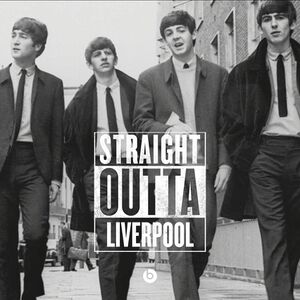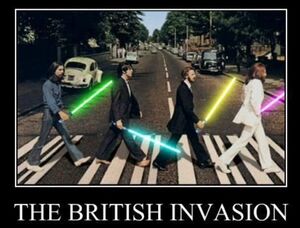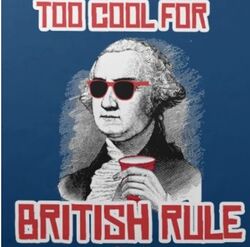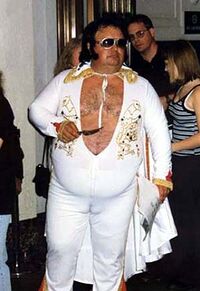1812: The British Invasion
The 1812 British Invasion is the American term for the period between 1964 and 1967 when continental USA was once more dominated by the forces of Great Britain. This period is known in the United Kingdom as the War of 1812 as hostilities commenced shortly before quarter past six on the evening of June 12th 1964, interrupting the news and raising the ire of the British people by distracting them from the weather forecast. When news bulletins were extended, forcing the cancellation of Coronation Street, the British were incandescent with rage and put out an appeal to every long-haired, unwashed denizen of the nation’s Art Schools capable of strumming a guitar, assembling an army as fearsome as that of the Duke of Wellington and equally well-deserving of the description as "the scum of the Earth.".
Background[edit]
The people of the thirteen colonies of America waited until Britain had defeated France and her native allies before acting on their cultural antipathy to tea and reasonable levels of taxation. Initially hesitant to forego British protection from the murderous threat of the squash-farming Narragansett tribe and the Gerbil-herding Penobscots, the settler communities became bolder as the indigenous population dwindled due to the effects of Measles, Diphtheria and weak-kneed, tasteless ale chilled to -270 °C (-454 F)[1].
With the warriors of the First Nations either dead or distracted scratching at their Smallpox scabs, the greatest threat to US security came from bands of roving Mexican Tequila salesmen and from disgruntled teenagers unable to get a prom date but easily able to acquire automatic weapons. The time had come to launch the Revolutionary War, if only to distract the rising numbers of heavily armed incels. Popular opinion was mobilised and soon the nation cried out to their leaders to overthrow the tyranny of King George and his cruel insistence on pluralising the word ‘Math’, singularising the word ‘Sports’ and spelling both ‘pluralising’ and ‘singularising’ with a sinfully fey ‘S’ rather than a wholesome, God-fearing ‘Z’.
Despite years of appalling violence, these brave/cowardly patriots/traitors {delete to taste} had soon overthrown their oppressors to enshrine into law their right to life, liberty and freedom to drive on the wrong side of the road. And by 1776 the American people made peace with the British to allow more time to shoot each other. In their turn, the British returned to their traditional pastimes of invading France and paying other countries to invade France on their behalf.
By 1963 the USA had been in charge of its own affairs for almost 200 years and, thanks to the efforts of Little Richard and Chuck Berry, complete musical independence had been achieved in the 1950s. Britain's war with France had been raging for almost 700 years and the Royal Navy was still engaged in an increasingly bitter struggle to rule the airwaves. US radio stations had long been blockaded and American disk-jockeys frequently impressed into service in the BBC. Finally, the US ran out of patience. War was declared, and to confront this naval outrage American forces crossed into Canada, possibly due to CBC-BBC confusion caused by Lyndon Johnson's dyslexia, possibly in the belief that no one in the UK would take an interest in America's aggressive intentions towards its Moose-bothering northern neighbours.
The religious establishment on both sides of the Atlantic demanded an end to hostilities but, whipped up by the tabloid press, the public on both sides saw the war as an opportunity to deal with unfinished business from the Revolutionary War.
The most hot-headed among the patriots wanted to expand their revolution to free the remaining territories of British North America: Canada and the Caribbean islands. Why, they argued, should their brothers be compelled to slave in the cane fields of Jamaica and to spell colour with an unsounded 'U' when they might slave in the tobacco fields of Georgia and be freed from the tyrrany of all spelling by being forbidden from learning to read? High Tories in England felt that there was time yet to civilise the rebels if only Lord North would authorise a shipment of Yorkshire tea, Cricket balls and buttered crumpets to every urban centre in North America.
Something had to give.
1964[edit]
US forces under General Presley crossed from Detroit into Ontario in June confident of success. Only a decade before, Presley has been a dominant force - so much so that he had single-handedly invaded and occupied Germany. But a diet of cheeseburgers, quualudes and deep-fried squirrel had seen his weight spiral, while he had unwisely delegated strategy to the less than reliable Colonel Tom Parker. As a result, the invading force spent a fruitless month wandering through the bush, trying to persuade local radio stations not to rebroadcast ‘Top of the Pops’ and failing to record a single listenable song while repeatedly stopping to film little-remembered B movies. On return to USA, Presley was accused of wasting time on a fruitless beaver-hunt, court-martialed and sentenced to be shot “pour encourager les autres” - a sentence[2]. eventually commuted to exile to the prison colony of Graceland where he was forced to wear the degrading flared satin jump-suits that had caused so many previous unlucky inhabitants to end their lives early.
The British, though hopelessly outnumbered in North America, were led by the aggressively macho Major-General Brian Epstein. Wasting no time, he seized the initiative, adopting an aggressive backbeat and sending The Beatles to occupy the Ed Sullivan show. At the same time, forces under the command of Hessian Hermann von Hermitt occupied the strategically important Michilimackinac Island, Lake Superior, bombarding Detroit with chirpy, up-tempo ditties to which the stricken city had no defence. Up to half the garrison fled at the first verse of I'm Henry the Eighth, I am,, and perhaps 1,500 died before the completion of Mrs Brown you've got a Lovely Daughter and the British Expeditionary Force knew that they were Into Something Good. Fearing destruction at the hands of Herman's wild Scottish regiment, The Animals, American forces in Detroit under the command of Gen.E Pitney surrendered without a fight.
A subsequent counter-attack led by Colonel ‘Lonely’ Roy Orbison, crossed the Huron River and was making good progress through the heavily wooded landscape when one of the stranger incidents of the War of 1812 occurred. The British column in the area was led by the inspirational Brigadier of Artillery, Manfred Mann. Mann's troops advanced, emitting haunting noises that the invading Americans took for the anguished howls of the dead, causing panic and disorderly flight of Orbison’s regiments. In fact, the roaring was nothing less than the regimental marching song.
In later years Orbison remembered the incident in an interview with the New York Times.
"It was a misty morning, kinda brooding. The fog seemed to be hanging on the trees and it felt like anything could be waiting for us over the next hill. My boys kept hearing weird noises like Doo wah Diddy floating through the woods. It kept coming and coming 'Doo wah Diddy', 'Doo wah Diddy' 'Diddy dum diddy dee' over and over. Oh, the inanity! The men just couldn’t take it; Those who didn’t run cut off their own ears with their bayonets but even that didn’t save them from Pretty Flamingo. War is Hell."
The swift victory planned by the American generals seemed further away than ever and opening skirmishes of the conflict appeared, against the odds, to be favouring the righteous (though not the Righteous Brothers, who were very much on the unrighteous, American side). Events failed to improve even when in December 1965 Another Side of Bob Dylan was revealed. The dishevelled former hobo raised an army of bums and marched north from Kentucky to retake Detroit. One wing of the force met British irregulars at Frenchtown and fled in the face of the steady volley of chirpy, FM-friendly ditties. The blame for this crushing defeat has traditionally been laid at the door of Dylan's second in command, Colonel Douglas 'Doris' Day. The famously virginal Day, however, blamed Dylan for forcing their troops into action they weren't ready for.
"How was I expected to know how to bring the engagement to a climax? It was my first time!"
With the first year of the war over, the British were firmly in control of America once more, with command of the industrial North in the hands of Majors Lennon and McCartney, ably assisted by Captain Harrison. A mobile laundry unit under Lance Corporal R. Starr levelled Buffalo when neither side could think of a reason not to.
1965[edit]
Stung by their lack of success the previous year, a mass of American entertainers marched north. Riding a wave of patriotism, The Beach Boys seemed unstoppable under the leadership of General B. Wilson, who planned to take Kingston, Ontario by surfboard, believing that cutting Canada in half in this manner would cause the Eastern provinces to drift across the Atlantic to Britain, swamping the mother country with garlic-sodden Quebecois and in-bred Newfies.
British military intelligence knew that the rag-tag collection of wandering minstrels then stationed in British North America would be no match for his four-part harmonies and sun-soaked, West Coast imagery. In desperation they published misinformation in the popular news pamphlet of the era, Canada Today eh!. Wilson's men showed no fear at suggestions the Merseybeats were assembling at Ottawa but rumours that prescription medicines were freely available in York, Ontario had an instant impact. Without warning, the American attack was diverted, and York was both captured and burned to the ground on May 25th, to the great relief of its mayor who had personally insured much of the metropolitan area. The British Field Marshall, Petula Clarke, was lost Downtown during the assault.
Hours later Wilson's troops captured Fort George on the Niagara peninsula in a surprise night attack. The bewildered British garrison commander, Donald 'Dusty' Springfield, demanded to know how Wilson had moved his forces so far so quickly. Wilson's enigmatic reply:
"I get around”.
The USA did not have the 1965 campaign entirely their way, however. Lieutenant-Colonel Ray Davis' crack unit of Muswell Hill Fusiliers took on American forces at Beaver Creek with some success. Davis' forces, known as The Kinks due to their depraved behaviour during the capture of Springfield, marched All day and all of the night to engage the so-called Supremes, the USA’s elite, Special Forces unit. On a Sunny Afternoon in April, despite devastating harmonies and mini skirts that would have unsettled lesser men, The Kinks prevailed and, within minutes of the battle beginning, Major Diana Ross raised the white flag, admitting You really got me.
Further west, The Swinging Blue Jeans could not bring Col. Matt Monroe to battle as he had stated his intention to Walk Away. With British lines of communication badly stretched and their flanks open to counter-attack, the Blue Jeans contented themselves occupying the town of Stoney Creek, unsettling the defending troops by the rattling their sabres as they marched - a manoeuvre known as The Hippy, Hippy Shake.
1966 and 1967[edit]

The next two years of conflict were a vicious and pointless stalemate. Major Otis Reading demanded Respect by securing Britain's retreat from Detroit, while Chrysler's Farm on the St Lawrence River was retaken when Colonel Gerry and his fast-marching Pacemakers cunningly commandeered a Mersey Ferry and used it to deliver a devastating broadside into Brian Wilson’s Sloop John B. Neither side had reason to wish to continue a conflict that seemed to be escalating into a pointless war of reprisals that benefitted no one. But individual commanders remained determined to make their names, with the most famous incident falling to Lieutenant Colonel A. Brown, an officer considered eccentric even in an age of unconventional military commanders. Brown insisted that his men wore their underwear on their heads, inserted a pencil in each nostril and hopped from the mouth of the Patuxent River to capture Washington “So they may not tire their other leg which they will need for the return march”. The Crazy World of Arthur Brown swept all before them until, tragically, Fire engulfed the Whitehouse and Arthur was unable to eat the state dinner kindly left behind by the fleeing President William Robinson, forever earning him the derogatory epithet Smokey.
Further south it was a different matter. In Louisiana, the British sent an army of Blues impersonators led by Generals Jagger and Richards commanders so obdurate in defence that they had earned the soubriquet The Stones. Jagger and Richards had orders to muddy the waters by capturing New Orleans. In a first for British arms, the army was accompanied by a balloon reconnaissance unit (forerunner of today’s RAF), known as The Yardbirds. Sadly, bad weather limited their involvement in subsequent battles, with Squadron Commander Jimmy Page unable to stop his balloons being blown Under, Over Sideways and Down.
American troops, perhaps inspired by the Yardbirds’ difficulties, rallied. Ably led from the front by Major General Douglas ‘Dolly’ Parton, they terrified the Redcoats with an incessant war cry keener at ear-shattering frequency again and again.
“If I live to be a hundred,” wrote Lieutenant Brian Jones “I shall hear that dreadful screech every moment - Jolene, Jolene, Jolene, Joleeeeeeeene!!!! I should rather have been shot through the head with a musket ball”.
In a fierce struggle that lasted from Nine to Five, the British were routed, with at least four whole regiments surrendering before a shot had been fired, lest they be subjected to Parton’s famously “most unwholesome, inhuman and inhumane weapon” - the Louisiana Militia’s famed rendition of I will Always Love You. It was a triumph for American arms, though ultimately a meaningless triumph as, unbeknown to either side, peace had been agreed months previously.
With American forces unable to kill The Zombies, the new British formation in the Great Lakes, and Field Marshall Johnny Hallyday assembling a French force in the hope of taking the attack to the British homeland, both sides had agreed to negotiate. The "Treaty of Ghent" was duly signed as it was felt that something of note should happen in Belgium eventually.”
Footnote[edit]
- ↑ The Celsius scale is named after Anders Celsius, the noted 18th-century Swedish astronomer but many Americans still prefer their temperatures to be measured in F - for For Fuck's sake.
- ↑ The sentence was found to be unconstitutional on appeal to the Supreme Court on the grounds that it was in an unintelligible, alien language



